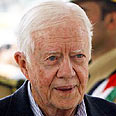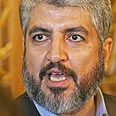

Former US President Carter defied US and Israeli warnings and met twice this weekend with the exiled leader of Hamas and his deputy, two men the US government has labeled terrorists and Israel accuses of masterminding attacks that have killed hundreds of civilians.
Carter is the most prominent American to hold talks with Khaled Mashaal, whose group claimed new legitimacy from the meeting along with two other sessions the Nobel laureate held with Hamas leaders in the Middle East this week.
''Political isolation (of Hamas) by the American administration has begun to crumble,'' Mohammed Nazzal, a top figure in Hamas' political bureau, said after Friday's meeting at Mashaal's Damascus office.
Carter met Mashaal and his deputy, Moussa Abu Marzouk, again for about an hour Saturday morning, after more than four hours of talks the night before.
''Several subjects were discussed, including (Israeli-Palestinian) crossing points, (captured Israeli soldier Gilad) Shalit, the siege on the Palestinians and a cease-fire between Hamas and Israel,'' Abu Marzouk said Saturday.
Another senior Hamas official in Damascus, speaking on condition of anonymity because he was not authorized to represent the group publicly, described the meetings as ''warm.''
But he said Carter did not receive a response to either of the two requests the former president made: that Hamas halt its rocket attacks against Israel, and agree to a meeting with Israeli Deputy Prime Minister Eli Yishai to discuss a prisoner exchange.
Nazzal said Gaza-based Hamas leaders would travel to Syria on Saturday to confer with Mashaal, and that Carter ''will be informed of Hamas' response in the coming days.''
But underscoring the impression that Carter did not win any concessions, Hamas said Friday that Shalit would ''not see the light'' until Palestinian prisoners are also released in an exchange.
Carter's convoy arrived at Mashaal's office for the meeting under tight security, and reporters were prevented from getting near the site. The meetings were closed to media, and Carter was not available for comment. He left Damascus mid-morning Saturday, flying to Saudi Arabia for the next leg of his Mideast tour.
US: Carter being 'exploited'
Echoing criticism from US Secretary of State Condoleezza Rice before the trip, State Department spokesman Sean McCormack suggested Friday that Carter had opened himself up to ''exploitation'' by both Hamas and the Syrian government.
''We find it very odd that one would encourage to have a conversation between the Israeli government and Hamas, which doesn't even recognize the right of the Israeli government to exist,'' McCormack said. ''Is that really the basis of a conversation?''
Several members of Congress also urged Carter not to meet Hamas leaders, saying it would confer legitimacy on the group behind dozens of suicide bombings and other attacks that have killed some 250 Israelis.
''We have a policy in this country about Hamas. And he is just deliberately undermining that policy, and it's wrong,'' Rep. Sue Myrick, R-NC, told Fox News on Friday, calling for the State Department to revoke the former president's passport.
The US government has no contact with Hamas after designating it a terrorist organization in 1995 _ an official label that means any financial or business transactions with the group are illegal. The government has also blacklisted Mashaal and Abu Marzouk, making it illegal to conduct any transactions with them.
Daniel Kurtzer, a former US ambassador to Israel under President Bush, called Carter's meetings with Hamas officials ''a strategic and tactical mistake.''
''Palestinians believe they cannot implement a peace agreement without Hamas, but they also understand that they can't reach such an agreement with Hamas in power,'' Kurtzer said.
Martin Indyk, a US ambassador to Israel under President Clinton, said ''the problem with trying to bring Hamas into the negotiations is it will force Israel out.''
Hamas official Mushir Masri, in a fiery speech Friday to thousands of Hamas supporters in Gaza, said the meetings with Carter were proof that Hamas was not a terrorist group but a national liberation movement.















